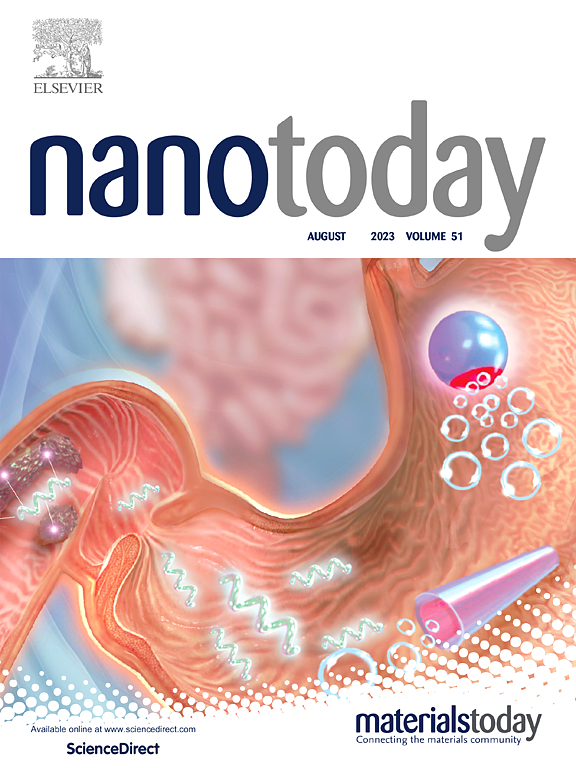DNA-MOF杂交纳米系统通过凋亡mRNA的放大成像预测光动力治疗效果
IF 10.9
1区 材料科学
Q1 CHEMISTRY, MULTIDISCIPLINARY
引用次数: 0
摘要
光动力疗法(PDT)是一种很有前途的抗癌治疗方式,但其治疗效果的早期评估仍然具有挑战性。在此,我们提出了一个光疗平台,可以通过凋亡mRNA生物标志物的实时放大成像来原位监测和预测PDT疗效。该DNA-MOF纳米系统(表示为PCN@HCR)将卟啉mof与基于dna的杂交链反应(HCR)探针集成在一起,促进了高效的PDT和敏感的mRNA检测。体外研究表明PCN@HCR诱导辐照剂量依赖性细胞凋亡,并通过基于hcr的信号扩增特异性检测Bax mRNA,显示Bax mRNA水平与细胞凋亡呈正相关。体内研究证实,PCN@HCR在激光照射下有效抑制肿瘤生长,而肿瘤内Bax mRNA的荧光信号与肿瘤体积减小相关,证实了Bax mRNA作为PDT反应的潜在生物标志物的作用。这个光疗平台通过提供对治疗反应的实时洞察,为精确和个性化的癌症治疗提供了一种有前途的方法。本文章由计算机程序翻译,如有差异,请以英文原文为准。
A DNA-MOF hybrid nanosystem for prediction of photodynamic therapy efficacy via amplified imaging of apoptotic mRNA
Photodynamic therapy (PDT) is a promising anticancer treatment modality, however, early evaluation of its therapeutic efficacy remains challenging. Herein, we present a phototheranostic platform that enables in situ monitoring and prediction of PDT efficacy through real-time, amplified imaging of apoptotic mRNA biomarkers. This DNA-MOF nanosystem (denoted as PCN@HCR) integrates of porphyrinic MOFs with DNA-based hybridization chain reaction (HCR) probes, facilitating both efficient PDT and sensitive mRNA detection. In vitro studies showed that PCN@HCR induces irradiation dose-dependent cell apoptosis and specifically detects Bax mRNA through HCR-based signal amplification, revealing a positive correlation between Bax mRNA levels and cell apoptosis. In vivo studies validated that tumor growth was effectively inhibited by PCN@HCR upon lase irradiation, while fluorescent signals of intratumoral Bax mRNA correlated with reduced tumor volumes, confirming the role of Bax mRNA as an potential biomarker for PDT response. This phototheranostic platform offers a promising approach for precise and personalized cancer therapies by providing real-time insights into treatment responses.
求助全文
通过发布文献求助,成功后即可免费获取论文全文。
去求助
来源期刊

Nano Today
工程技术-材料科学:综合
CiteScore
21.50
自引率
3.40%
发文量
305
审稿时长
40 days
期刊介绍:
Nano Today is a journal dedicated to publishing influential and innovative work in the field of nanoscience and technology. It covers a wide range of subject areas including biomaterials, materials chemistry, materials science, chemistry, bioengineering, biochemistry, genetics and molecular biology, engineering, and nanotechnology. The journal considers articles that inform readers about the latest research, breakthroughs, and topical issues in these fields. It provides comprehensive coverage through a mixture of peer-reviewed articles, research news, and information on key developments. Nano Today is abstracted and indexed in Science Citation Index, Ei Compendex, Embase, Scopus, and INSPEC.
 求助内容:
求助内容: 应助结果提醒方式:
应助结果提醒方式:


